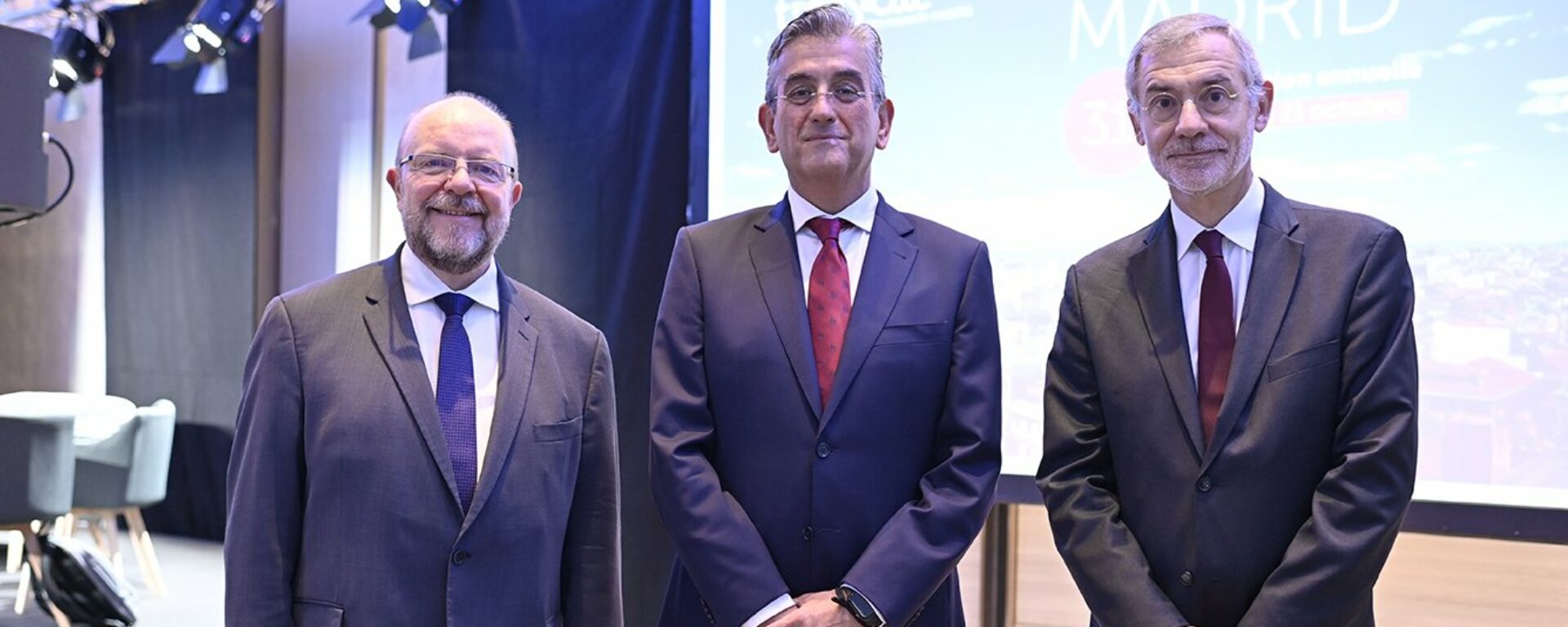The Trans.cité association chose to hold its annual convention in Madrid this year and focused on the many challenges of organizing suburban mobility. Pascal Bolo, President of Trans.cité, and Luis Miguel Martinez, General Manager of the Madrid Regional Transport Authority, welcomed nearly 100 elected officials and players in the field of daily mobility, in order to get a closer look at the unique aspects of Madrid, and then to broaden their points of view based on this inspiring experience.
For more than 35 years, the Madrid Metropolitan Transport Authority has been deploying a reversible infrastructure that is unique in Europe to better organize peri-urban mobility and to help people switch from private cars to public transportation.
In France as in Spain, the challenges of peri-urban mobility are confronted with a wide variety of situations, depending on the geography of the territories as well as political traditions.
Pascal Bolo, President of Trans.cité
In all cases, it is essential to understand the peri-urban level around which many social, economic and environmental issues are crystallizing, more than ever, and where one in four French people live.
Taking hold of the peri-urban area means better thinking about density and land use planning and replacing the symbolic mayor-architect couple with the mayor-architect-geographer trio.
Christophe Bouillon, Mayor of Barentin, President of the Caux-Austreber Communitý of Municipalities and President of the Association of Small Towns of France
As for the relationship between urban and peri-urban :
The question for the communes will not lie in the loss or transfer of competence, but rather in the adherence to the project. We need to adopt a management approach. With existing resources, we can already do better without claiming to put all territories under the same roof.
Michel Neugnot, 1st Vice-President responsible for Mobility, School Transportation, Intermodality and Infrastructure at the Regional Council of Bourgogne-Franche-Comté
The recent change of nomenclature by INSEE (the French National Institute of Statistics and Economic Studies) on the peri-urban area provides an opportunity to get rid of some preconceived ideas about these territories with shifting boundaries.
Occupying a large area with a fairly limited population, they are neither poor nor abandoned spaces. Moreover, they are territories that people choose to live in, because they choose their neighbors.
Jacques Lévy, Geographer
Peri-urban areas are also proving to be places where major ecological transitions are being accelerated, such as the Auxerrois region, which has been mobilized for green hydrogen.
Crescent Marault, Mayor of Auxerre and President of the Auxerrois Community.
They are also places of experimentation and « laboratories of participatory democracy », according to Christophe Bouillon. They can claim to be an opportunity for neighboring metropolises.
This is the case of Libourne, which has the necessary space to house students in Bordeaux, which is saturated by the Airbnb phenomenon.
Philippe Buisson, Mayor of Libourne and President of the Libourne Urban Community
Thus, the routes intended to carry the future peri-urban mobility will have to:
- Be articulated around structuring axes to obtain a relative massification with trains, Bus Rapid Transit lines (BRT), tram-trains, suburban tramways (as in Barcelona), carpooling lines, etc.
This is what Mulhouse is doing, and this year it is celebrating the 10th anniversary of its tram-train linking the city and its services to Wittelsheim, at the bottom of the valley.
Yves Goepfert, vice-president in charge of Infrastructure, Transport and Mobility at Mulhouse Alsace Agglomeration and Mayor of Wittelsheim.
New Aquitaine has opted for the CHNS in order to respond to the congestion in Bordeaux with a wide range of services and faster service by limiting the number of stops.
Pascal Morganti, Regional Director of Transdev Nouvelle-Aquitaine & Occitanie.
- Offering finer service around intermodal hubs and motorway stations : « like the pioneering and still emblematic Briis-sous-Forges station [Essonne], on the territory of the Pays de Limours Community of Municipalities, » points out William Berrichillo, Vice-President in charge of Transport Organization and Economic Development for the Pays de Limours Community of Municipalities and Mayor of Saint-Maurice-Montcouronne. At the same time, we need to think about the management of park-and-ride facilities and bus stations with a view to creating service hubs and modal nodes serving more or less dense areas.
We also need to bring parking operators and transport operators together at park-and-ride facilities to share and make the space more profitable.
Marie-Josée Nalher, Deputy Director of Parking and Delegated Management, Bus Stations and Park-and-Ride facilities for Aix-Marseille-Provence Metropole
- Providing customized alternative mobility solutions, such as the « new generation Transportation on Demand (TOD) deployed in the Cotentin region, coupled with long-term rental of electric bicycles », says Arnaud Catherine, Vice-President in charge of Mobility for the Cotentin Communauté d’agglomération, or the introduction of « Lulu », « these electric vehicles that have been crisscrossing the Lunéville region since September 2021 », says Guillaume Cornil, Director of the PETR of the Lunévillois region. As for the Greater Lyon Metropolis, « it is encouraging carpooling to capture the massive flows from the suburbs to the center by setting up reserved lanes on 14 km of highway, » adds Pierre Soulard, Head of the Urban Mobility Roads Department, Roads, Plants and Cleaning Department, at the Greater Lyon Metropolis. Finally, the French Mobility Orientation Law (LOM) provides the necessary toolbox for the suburbs to build bridges with neighboring metropolises and develop new mobility solutions that will help make these areas new poles of attractiveness.
Pictured above: Pascal Bolo, President of Trans.cité, Luis Miguel Martinez, General Manager of the Madrid Regional Transport Authority, and Thierry Mallet, Chairman & CEO of Transdev Group. (Photo credit: Franck Dunouau

